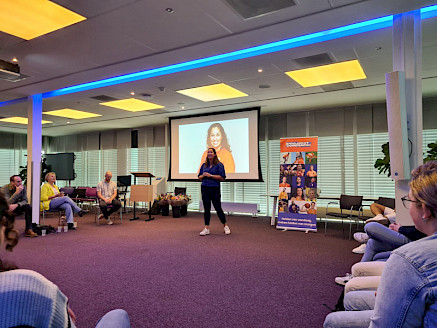Success stories
Team Student+ is proud to present the success stories. It gives a broad overview of all the great things we have realized together and of which we are very proud of. Enjoy reading and watching!
NPO Projects
Yesterday an energetic study day at Fontys ICT where there was plenty of attention for student well-being and the completion of the NPO projects from the National Education Program of the Ministry of Education, Culture and Science
In addition to the insights and results that have been shared, more input has been collected to secure the projects and integrate them within our education. In this way, the chosen interventions will also have sustainable positive consequences for our students and colleagues
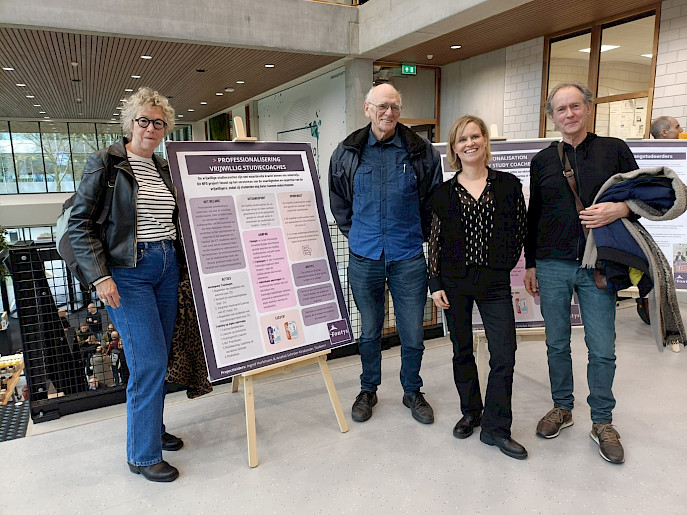
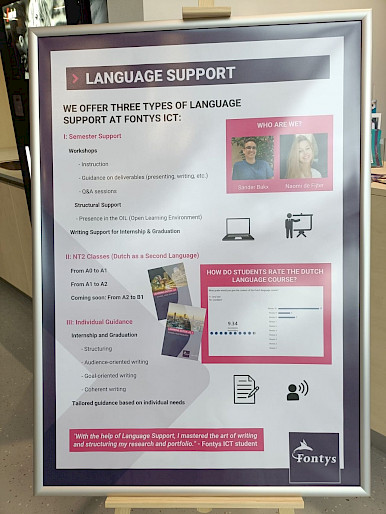
Ranomi Kromowidjojo steekt studenten hart onder de riem
Niet praten over studenten, maar mét studenten over hun mentale welzijn. Dat stond dinsdagmiddag centraal tijdens een bijeenkomst van Studievereniging IERA van de Tilburgse opleiding ICT. Met als eregast Olympisch kampioene en oud-topsportster Ranomi Kromowidjojo.
“Het is een niet vaak voorkomende combinatie, topsport en ICT”, grappen Julian en Niels voordat de bijeenkomst op Campus Stappegoor van start gaat. Beide studenten maken deel uit van studievereniging IERA en zijn de initiatiefnemers van de bijeenkomst. “Maar het maakt vandaag niet minder waardevol. Ranomi kan ons namelijk alles vertellen over wat je kunt bereiken als je inzet en doorzettingsvermogen toont en hoe je om kunt gaan met tegenslagen in je leven. Dat is iets waar iedereen wat van kan leren.”
Beide heren merken namelijk dat de motivatie onder studenten sinds de coronapandemie steeds moeilijker te vinden is. “Zeker wanneer academische resultaten tegenvallen. Het is voor ons ontzettend belangrijk dat onze medestudenten zich goed voelen en lekker in hun vel zitten en we willen ze daarbij helpen. Daarom roepen we vandaag juist die olifant in de kamer op. Al zit er maar één student die hier vandaag iets aan heeft, dan hebben wij al winst geboekt.”
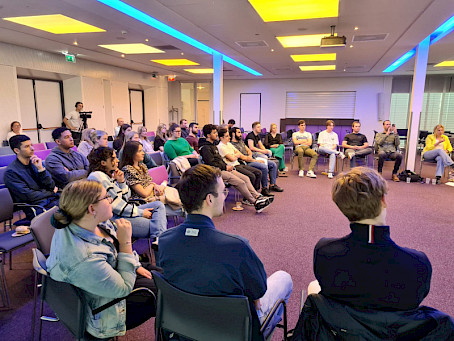
Omgaan met verlies
Wie veel afweet van winst, maar ook zeker van verlies, is Ranomi Kromowidjojo. Ze nam deel aan de Olympische Spelen in Tokyo, Rio, Londen en Beijing, won drie maal goud en heeft nog steeds het wereldrecord op de vijftig meter op haar naam staan. “Maar we gaan het vandaag niet over sport hebben”, aldus de oud-zwemster. “Ik ben hier niet als topsporter, maar als mens. Een mens dat heeft geleerd middels vallen en opstaan, dat meer wedstrijden verloor dan won en dat om moest leren gaan met verlies.”
Kromowidjojo vertrok op haar zeventiende van Groningen naar Eindhoven om de beste zwemster van de wereld te worden. Een, zoals ze zelf zegt, verlegen meisje dat het lastig vond om dingen te vragen en zich uit te spreken, maar dankzij de topsport leerde dat ze dingen juist wél moest doen of moest laten. “Als klein meisje werd ik uitgelachen wanneer ik vertelde over mijn droom, dus verzamelde ik mensen om me heen die in me geloofden. Met prachtige resultaten tot gevolg.”
Eenzaam en sterk zijn
Die kwamen natuurlijk niet aanwaaien. Kromowidjojo bracht iedere zes dagen minsten 25 uur door in het zwembad, met meerdere trainingen per dag. “Ik was vaak alleen en misschien ook wel eenzaam. Ik had graag iemand gehad om leuke dingen mee te doen, of iemand die naast me zat en er gewoon voor me was zonder ook maar iets te vragen.”
Ze liep vaak tegen dingen aan die ze – vooral van zichzelf – zelf op moest lossen. “Ik wilde niet klagen, want daar hou ik niet van. Maar ik wilde ook niet zwak overkomen, want als topsporter ben je sterk.”
Toch vielen in de zomer dat Kromowidjojo 24 jaar werd een paar belangrijke mensen weg in haar leven. Haar coach vertrok en haar vriend zette een punt achter hun relatie: een greep uit de factoren die ervoor zorgden dat de houvast en de zin in het leven van de Groningse wegviel. “Toen dacht ik shit, dit kan ik zelf niet meer oplossen.”
Lichtpuntjes
De vragen borrelden al snel op: “Wie ben ik? Wat ben ik? Hoe ga ik hier uit komen? Ik kon deze vragen niet zelf beantwoorden, maar ik wilde ook niet bellen met mijn beste vrienden, ouders of een psycholoog. Terwijl je daar echt alles mee kunt bespreken.”

Enige tijd later vond Kromowidjojo een heuse ‘mentor’. “Hij leerde me de lichtpuntjes in mijn leven te zien, door het juist niet over Ranomi de zwemster te hebben, maar over Ranomi de persoon. De persoon die ik werkelijk ben.”
Iedere keer nadat ze met haar mentor contact had ging de zwemster met een lichtpuntje naar huis. “Hoe kut die andere 23,5 uur per dag ook waren, dat ene half uurtje gaf me weer opnieuw positieve energie. Uit die dip komen ging echt niet van de ene op de andere dag, maar na drie maanden voelde ik me wel weer oké."
Jezelf accepteren
Sinds die periode realiseert Kromowidjojo zich dat het geen zwakte is om toe te geven dat het niet goed gaat. "Het zorgt er juist voor dat je aan jezelf durft te werken. Vergeet niet: je moet de rest van je leven nog met jezelf doen. Dan is het fijn als je jezelf accepteert.”
Volgens de oud-topzwemster moeten de studenten daar nog één belangrijke les in meenemen. “We hebben ook echt elkaar nodig. Al is er maar één iemand op de wereld die jou kan helpen op fysiek gebied, met je studie of met je baan, zorg dat je daar contact mee maakt. Mijn mentor was mijn ene iemand, en dankzij hem zit ik nu weer lekker in mijn vel.”
Round-up Project ID+
The Inclusion & Diversity (ID+) team was set up as part of Student+ to form a deepening of this broader student welfare initiative. This project ran from 2021 to the end of 2023. ID+ initiated and supported various initiatives, which increase the accessibility and safety of Fontys ICT at our locations in Tilburg and Eindhoven. Whether for students, employees or partners; a safe and open environment with space for everyone is essential for being who you are and becoming who you want to be.
ID+ maintained close contacts with the Inclusive Society (M&M) program team and provided expertise to other Fontys institutes and services on request.
Want to read examples of things this great team has made happen? Then be sure to click on one of the links below.
Autism Awareness December 2023
During the weeks of December 4 and 11, Fontys' autism ambassador (Roy Houtkamp) was again active in raising awareness.
On December 7, he was at the Eindhoven municipality to assist with the intervision. This group already had experience with autism and the expertise and experience was especially called upon to give input on specific cases.
On December 11, he attended the Venlo location, where he gave a workshop on the basics of autism to the study programmes' T&L tutors. Also discussed there was Student+ as a possibility for the Venlo campus.
On December 14, the ambassador was again at the Municipality of Eindhoven. This time with the group of employees who really wanted to know the basics about autism. Here, then, the AAP workshop (Autism Awareness Project) was given, which was also done in Venlo.
All three meetings were a success. They were well received and useful knowledge was exchanged.
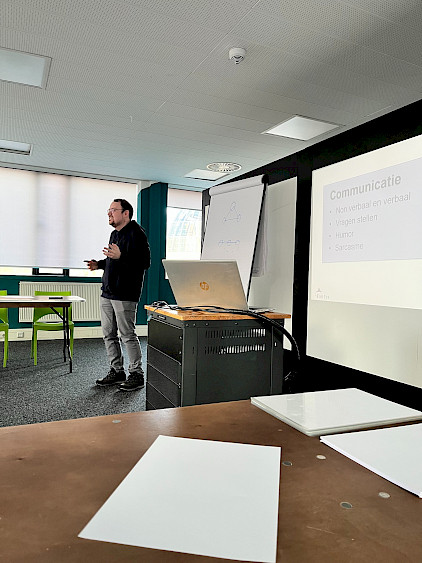
On December 14, the ambassador was again at the Eindhoven municipality. This time with the group of employees who really wanted to know the basics about autism. Here then was given the AAP workshop (Autism Awareness Project), which was also done in Venlo.
All three meetings were a success. They were well received and useful knowledge was exchanged.
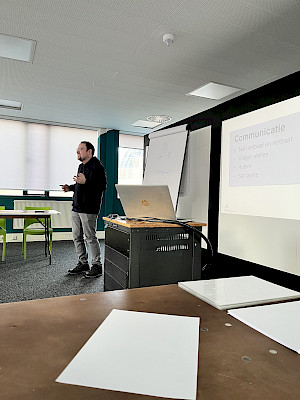
10th anniversary of Student+
Monday, October 30, 2023, Student+ celebrated its 10th anniversary, and it was well celebrated! The festive day began by treating our students and staff to a delicious smoothie at each location (R10, P8, TQ and Mindlabs). In the afternoon a group of 80 (former) volunteers, (former) colleagues, (former) interns and others who contributed to Student+ gathered. After a festive opening, Ariana van Heijnigen took us through an impressive master class on the art of asking questions. Finally, we all toasted to this wonderful milestone and were spoiled with all kinds of nice surprises, gifts, messages and lots of nice words! We are incredibly grateful to everyone for all the help, because of this we have grown and are so strong today. We have been able to help thousands of students on their way and provide appropriate support over the past ten years, and we hope to do so again in the next ten!
Want to relive the experience? Then watch the aftermovie by clicking here.
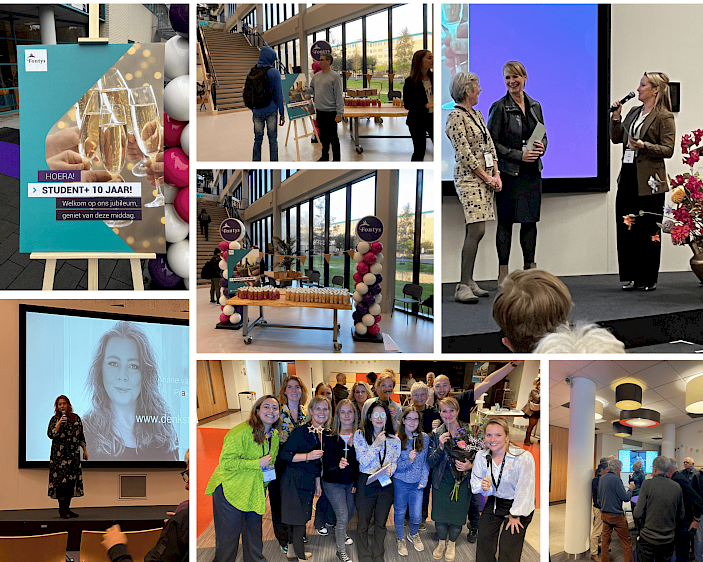
Opening Studyhub+
During the fall semester of 2023, Student+ was able to open the doors of the Studyhub+. This space can be found in building R10 in Eindhoven in room 4.36. This is an additional space, as an addition to the already existing office in space 4.45. In the Studyhub+, for example, training sessions of Student+ take place and the walk-in hours for help with language and planning. This space is also used for 1-on-1 conversations with students. During the design of this space the goal was to create a living room atmosphere, as you can see in the pictures this has worked out well! When a student walks into our office with a question or to start a conversation, we can sit together in the Studyhub+, in order to help you further in a comfortable atmosphere!
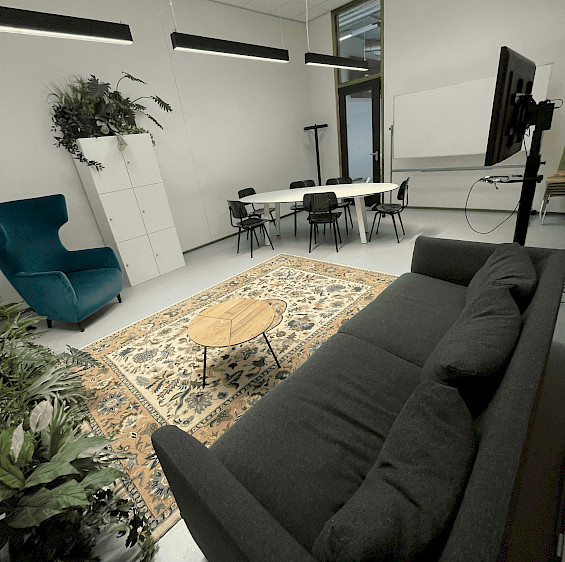
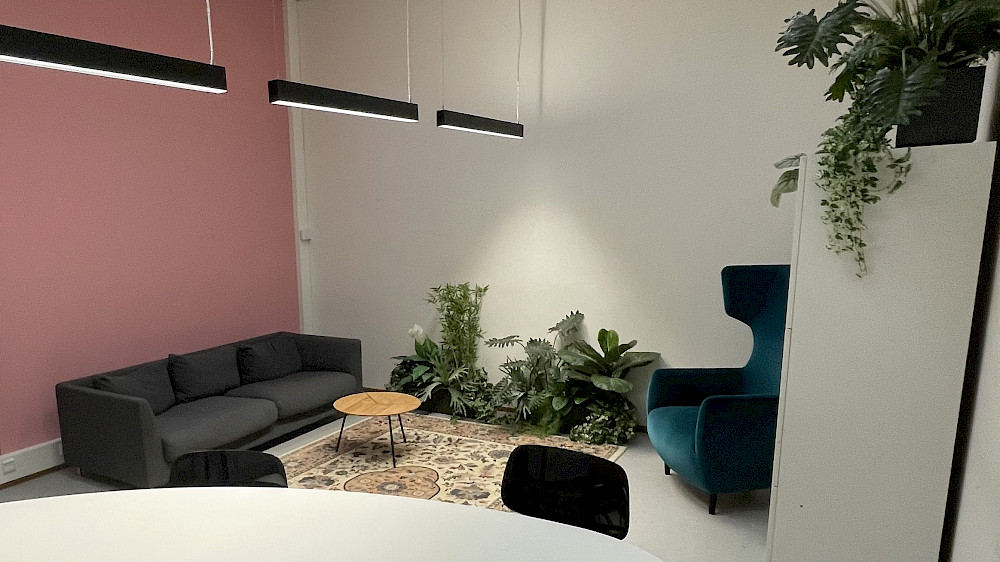
Signing the Declaration of Intent for higher education institutions
Maximum development for every student, that is Fontys' ambition. To add force to that ambition, yesterday Fontys signed the 'Declaration of Intent for UN treaty higher education institutions'. Signatory Joep Houterman of the Executive Board of Fontys: 'By signing the declaration of intent, we are giving Fontys a boost as an inclusive educational institution.'
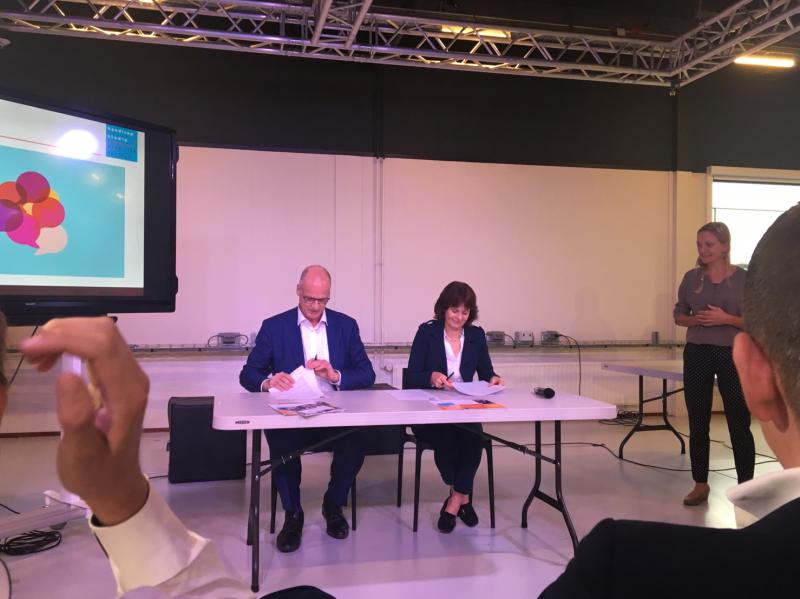
According to Handicap & Study, research shows that thirty percent of students have a disability. Ten percent experience barriers when studying. In addition to the existing laws, the UN Convention relies even more on inclusion, or the removal of barriers making education accessible to all. So this applies not only to students with disabilities, but also to family caregivers or elite athletes.
Knowledge sharing
In the presence of students, lecturers, employers and representatives of Handicap & Studie, the municipality and the Ministry of Public Health, Fontys and Tilburg University signed the declaration of intent of the UN convention yesterday. Fontys and Tilburg University are the ninth and tenth educational institutions to sign this declaration of intent. In addition to promising to allocate themselves to inclusive education, the signatories are also committed to knowledge sharing in areas such as information provision, promotion of expertise, awareness, ownership, inflow and outflow, and digital and physical accessibility.
Disability as an advantage
Fontys University of Applied Sciences ICT initiated the signature of the convention at Fontys in Eindhoven. Managing director Ad Vissers: 'What one person calls a disability may be a benefit to another. Not everyone fits into the same mold. We find it important to empower the talents of our students rather than deny them and move on to the future.' Fontys University of Applied Sciences ICT, for example, works with Carapax, a commercial IT company with a social principle that employs purely IT professionals with autism. Managing director Addy Borst says: 'These people have a high cognitive level, but don't get a job in the labor market. That is a shame. We use job coaches and offer each employee a tailor-made approach that allows them to perform optimally.'
Optimal development
How will Fontys tackle this? Houterman: 'By signing the declaration of intent, we are giving Fontys a boost as an inclusive educational institution. In addition to generic measures, we have to offer customization. We recently formulated our principles for student coaching and student welfare. In it, we have established that every student must be able to develop himself optimally. The institutes are translating this ambition into a policy on student coaching. In addition, we are experimenting in the hbo with flexible education, which means that every student receives customized education. He jokes, "If this goes as we hope, in five years we won't need a UN convention at all.
The study coach takes the weight off my shoulders
Making a good planning is the biggest problem of ICT students Marie-Rose and Michel. Many adolescents suffer from this, but with disorders such as autism or ADHD you get stuck faster in your study programme. For that group, as well as other students who could use help, Fontys ICT offers the study coach. And that seems to work well.
The study coach is an outside volunteer, often with a background in education or social work. He or she frees up a few hours a week to help students at Fontys ICT with planning and organizing. These are students like Marie-Rose and Michel, both of whom have a condition on the autistic spectrum. Both already suffered burnout once and had to discontinue a previous study programme.
"Without my study coach Josefien, this study was much more difficult for me," Michel says. "I tended not to discuss problems, which made them bigger and bigger. Then if I couldn't figure something out, I would stay there for an hour looking at it. Now I am quicker to tell lecturers and students that I am autistic. Then at this study programme I often hear, 'me too,' haha."
"My information processing is different, slower. I can't listen and write down at the same time. That's why after a course I always download the powerpoint to look back later. For me, high school education was easier. Each chapter was just long enough. But here I have to set my own deadlines and priorities. When this fails, frustration rises and motivation drops. Josefien helps me to prioritize and plan better."
A recognizable story for Marie-Rose. "My problem is also that I can get completely bogged down in, for example, a certain tooling, then work on it for two days, while it says eight hours. I forget to ask for help."
Her study coach has tried different ways of planning with her. "It turns out I work best with a rough weekly schedule. Since then, we also talk more and more personally about how things are going at school.
Indeed, in addition to planning, group work in the study programmes is often tough for Marie-Rose. "In itself I don't mind doing that once in a while, but not all the time. I would like it better if we had more freedom of choice in that. For me it is very hard because I am very sensitive to stimuli.
We always work in large rooms with lots of people together. In semester 4 I was doing very badly again because of that. My coach then takes the weight off my shoulders. It helps when someone listens and thinks about a solution. I think I've grown recently partly because of the coach."
The study coach exists alongside social workers such as the dean or student psychologist. "But it's more accessible," explains Floortje van Hees. She is coordinator at Team Studentplus, which supports ICT students who need extra help. "You go to a dean for more intensive help, for example for help with financial problems. The study coach is mainly there for help with planning and organizing studies."
The Studentplus Team forwards the student to the study coach. "At the beginning of the academic year, we also always visit classes to tell them what we do," Van Hees says.
Source: Merkx, P. (16-04-2019). De studiecoach haalt het gewicht van mijn schouders. Geraadpleegd van: https://bron.fontys.nl/de-studiecoach-haalt-het-gewicht-van-mijn-schouders/
Roy Houtkamp launches Autism Platform Fontys University of Applied Sciences
On February 4, 2019, Roy started the Autism Ambassador study programme from the Autism Embassy, with the aim of establishing an Autism Platform for students and employees within all Fontys universities of applied sciences. At Student+, Roy already fulfills the ambassador role with verve, which is why he was approached by the Autism Embassy for this official job. FH ICT hereby makes Roy's extensive knowledge and experience available to other universities of applied sciences.
The Autism Embassy is a project developed by Vanuit Autisme Bekeken (VAB). VAB is a program from the government for inclusiveness in all domains and areas of life. The approach is to see what impact autism can have on these areas of life and what support needs to be offered so that people with autism can contribute to society. Autism has been chosen as a perspective because the help people with autism need is often similar to people in other special circumstances.
The Ambassade gives employees within large organizations such as Shell and Achmea an ambassadorial role where they establish a platform for employees with autism to share experiences and support each other. Roy is going to establish this platform for Fontys University of Applied Sciences. At Fontys, we not only deal with employees with special circumstances, but also students. We also want to deal with this in an inclusive way. That's why Roy would like to spread information to everyone about what impact autism has and how to deal with it. So it will be a platform with an advisory role that provides Fontys as a whole with information that is also useful for daily educational practice.
Training 'Utilising Autism Talent' of Discover Autism for Partners in Education
There is a huge shortage of highly skilled ICT professionals who can see things differently. All talent is needed! Unfortunately, too many students with autism still miss the connection to a suitable job. In the Eindhoven region, more than 110 cooperation partners from the business community work together with Fontys University of Applied Sciences to match students with autism to a successful job. Double win is the result! Space is created for differences, employees flourish and Autism talent is utilized. For a lasting good cooperation, knowledge is essential, this is why we organize a practical, targeted and instructive workshop!
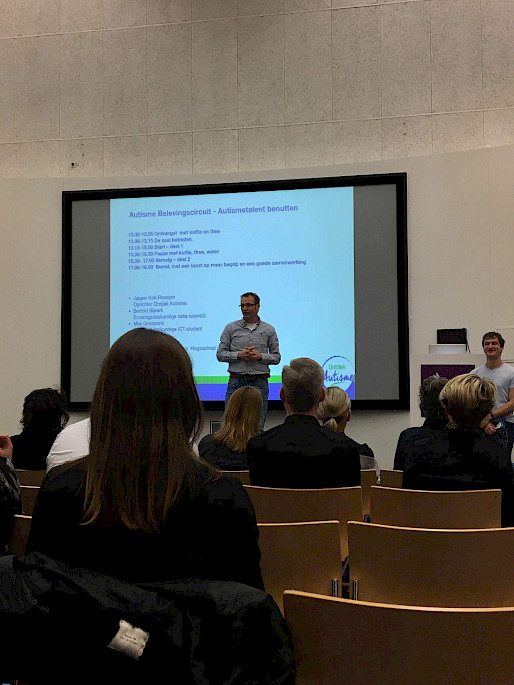 This workshop was held on March 26, 2018. There was great interest among the various Partners in Education to participate in it. The workshop combined theory with practice using lectures and stories of experience combined with challenging exercises. The experiences were very positive and led to a better understanding about autism and why good support is so important.
This workshop was held on March 26, 2018. There was great interest among the various Partners in Education to participate in it. The workshop combined theory with practice using lectures and stories of experience combined with challenging exercises. The experiences were very positive and led to a better understanding about autism and why good support is so important.
Pilot Autism Talent Utilization Fontys University of Applied Sciences ICT successful
On Monday, May 8, the results of the Autism Talent Utilization pilot were presented. This pilot has been running for a year at Fontys Information and Communication Technology, among others. A special feature of the pilot is that a number of parties worked together intensively: Fontys University of Applied Sciences (ICT, TNW & Engineering), Municipality of Eindhoven and Autismepunt. In addition, several employers were involved in the pilot. And with success. "It is a win-together pilot, all parties have gained," said an enthusiastic Marlou Heskes, coordinator Student+ Fontys University of Applied Sciences ICT.
The starting shot has been fired
Unemployment among young people with autism is 72%. The parties involved put their shoulders to the wheel and formulated ambitious goals: guiding students with (characteristics of) autism from an integral approach from finding a graduation internship to persisting in work after graduation and insight into failure and success factors of working methods. During the course of the pilot, 12 students started, of which 8 students have since passed, 3 students are currently still on internship and 1 student dropped out. As many as 62.5% of participating students are employed (the goal was 50%). Nicole Ficheroux, Autism Point, explains, "The starting shot has been fired. Now it can start flowing."
Coaching increases student visibility
"Students procrastinate. For example, they deliberately don't pass their internship to delay their studies and postpone working life. What we also see is students continuing their studies just to avoid working. By coaching, you know a student's strengths, but also their vulnerabilities. And that is important: to be very student-near," said Marlou Heskes. Coaching a student thus increases a student's visibility; he literally stays in the picture. In addition, the student knows where he stands, how things are progressing and has insight into what is needed to positively complete the study. Safety is crucial here. The student has to learn to realize that he has to switch from study to another context, where he has to prove himself again. Rogier van Velthoven was one of the students who participated in the pilot. He had his doubts at first, but is very positive about his experience with the pilot. "It was for my graduation phase. How am I going to pick this up? How do I make a presentation? A thesis? I got a job coach with whom, among other things, I discussed my schedule and visited my workplace. Eventually I graduated and came full circle: I'm working at my old study programme (Fontys University of Applied Sciences Information and Communication Technology) as a fully paid employee."
Inclusive vision propagated by Fontys University of Applied Sciences administrators
According to Nicole, people with autism have a different form of development, they need more guidance. At the moment you offer guidance, maybe other competences are more important. One must tailor the direction by broad allocation of expertise. Within Fontys University of Applied Sciences it is still too dependent on the Fontys field of study whether the student is offered additional guidance. "Fontys broad you see that knowledge of autism is not yet present everywhere, at Fontys ICT and Engineering they are already far open to it," said Nicole. Administrators at Fontys University of Applied Sciences can be an important inspiration by taking action in the inclusive vision and showing that this can go hand in hand with clear study goals. Carrying out together that one can be flexible in the way to achieve those goals and rewarding if one succeeds in keeping students on board.
Tailor-made personal guidance
Jelle Raaijmakers, software architect at ISAAC, mentored a student during his internship. "Because it became clear from both the student and the job coach's guidance at an early stage what we needed to pay attention to, the start-up with the student went smoothly." The student received personal guidance during his internship, completely customized. Currently, there is very little awareness among employers about autism. The checklists (how do I make my company more autism-friendly) are widely allocated. Nicole says: "Employers with an open attitude and an eye for diversity often do well. They need to be aware that these students need extra guidance."
Talent is what matters
Gemeente Eindhoven is one such employer with an open attitude. "Talent is what the Brainport is all about. We need all the talent. The pilot shows that with a little effort you can give young people with autism more chances of employment and thus also show their talents, "said Staf Depla, Municipality of Eindhoven. One-on-one guidance is crucial here. It gives just that extra bit of support. In addition, cooperation by sharing insights and experiences with each other (both during and after the internship) and looking at the home situation of the student.
Student+ do not let go after study
It is important not to let go of the student, even if he has a job. How to proceed now? What do you need? What does applying for a job mean? "People with autism are special, talented, but also vulnerable people," Nicole explains. Mutual trust is important here, because if you do not dare to trust in the talents and strengths of another person, you can at best achieve that the other person follows you in your goals.
Roy Houtkamp, experienced participant of the coalition 'Viewed from Autism' and now employed by Fontys, adds that people are like flowers. Their talents blossom when the environment comes together to nurture them with the right support and an appreciation for diversity in color and form. "Broadening the pilot would be very valuable. The foundation has been laid by the many parties involved. Now it's transferring our knowledge to other institutions," Roy said.
Sharing successes with each other
And how to move forward? What are the plans for the future? Two things are important now: securing this working method within the Eindhoven region and secondly inspiring other regions with this working method. Sharing successes.
From the perspective of autism, the initiator is to transfer the positive results of the pilot to other areas in the Netherlands. Here it is always important to connect with regional initiatives and motivated professionals. "The allocation of experiential expertise in shaping solutions is very crucial here, as this pilot again shows," explains Carien van Hooff, coalition Viewed from Autism. Not only the students benefit from the approach in this pilot, the employers are big winners as well. "The Brainport region has a huge shortage of creative people who can see things differently. People with (characteristics of) autism are original thinkers, often do not think in the standard pattern," Carien said. The innovative power that the IT sector is looking for therefore lies partly with this target group. The investment of customized coaching therefore prevents dropout and frustration of students, loss of valuable talent and high social costs as a result: from double loss to double profit.
Other universities of applied sciences are interested in this approach and can learn a lot from each other in this area, but above all they can learn with each other. That is what we are going to work on. Fontys University of Applied Sciences ICT can be a good example in this. "What we have now achieved must be secured. In the next four weeks, we are going to work with the various parties to concretize how the working method in the pilot can be incorporated into everyday practice within Fontys, not only in the ICT study programme, but also in other study programmes," says Carien. As Fontys director Nienke Meijer put it, "we should not get stuck in pilots, but dare to take structural steps now."
Student+ gives workshop on autism talent development at Knowledge Festival "Learning in Brainport."
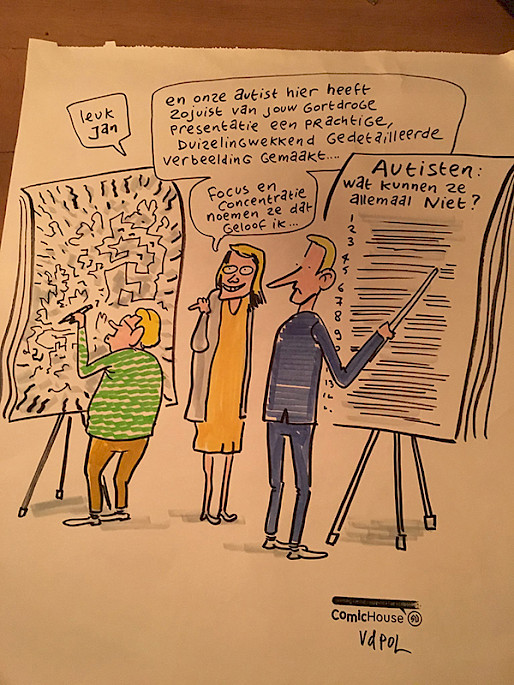 Roy Houtkamp and Marlou Heskes' workshop was packed with enthusiastic participants. In addition to the workshops, there was keynote speaker Bas Haring. Haring's talk on research in education,dovetailed well with Fontys ICT's vision: "Do research on a theme that touches you personally, ask a closed question, make use of the resources you have available and criticism is a good grip." But surely the funniest thing about the festival was the cartoon.....
Roy Houtkamp and Marlou Heskes' workshop was packed with enthusiastic participants. In addition to the workshops, there was keynote speaker Bas Haring. Haring's talk on research in education,dovetailed well with Fontys ICT's vision: "Do research on a theme that touches you personally, ask a closed question, make use of the resources you have available and criticism is a good grip." But surely the funniest thing about the festival was the cartoon.....
Job Coaching from an Autism Point of View
The number of students with autism is increasing. Because the study pressure has increased in recent years, students with autism also indicate more often that they need extra guidance. With the pilot 'Autism talent utilization' Fontys is responding to this, together with the municipality of Eindhoven and Autismepunt. Within the pilot, four job coaches guide thirteen students with autism from the moment they start their internship to finding and keeping a job. Read the article here.


